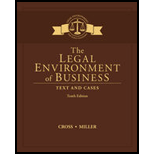
Lms Integrated Mindtap Business Law, 1 Term (6 Months) Printed Access Card Cross/miller’s The Legal Environment Of Business: Text And Cases, 10th
10th Edition
ISBN: 9781337093897
Author: Frank B. Cross, Roger LeRoy Miller
Publisher: Cengage Learning
expand_more
expand_more
format_list_bulleted
Question
Chapter 8, Problem 7BCP
Summary Introduction
Case summary: A person RK, an employee of the USDA, gave another person JL two unreleased varieties of grapes. Such an act was unauthorized and the said varieties yielded no fecund fruit. Neither any grapes nor any plant material was sold to any other party. Though the plants were publicly visible, they were not labeled. Moreover, they couldn’t be identified by a simple viewing of the vines.
To e xplain:The applicability of USDA for patents on those two varieties of grapes.
Expert Solution & Answer
Trending nowThis is a popular solution!

Students have asked these similar questions
Help this accounting question answer
Can you explain the correct approach to solve this general accounting question?
Catalyst Enterprises uses the cash basis of accounting. During the year, Catalyst Enterprises made $845,000 in payments to its suppliers. The company's beginning inventory was $65,000, and its ending inventory was $95,000. Additionally, Catalyst had a beginning accounts payable of $110,000 and an ending accounts payable of $140,000. What is Catalyst Enterprises' Cost of Goods Sold (COGS) under the accrual basis of accounting?
Chapter 8 Solutions
Lms Integrated Mindtap Business Law, 1 Term (6 Months) Printed Access Card Cross/miller’s The Legal Environment Of Business: Text And Cases, 10th
Knowledge Booster
Similar questions
- Please help me solve this general accounting problem with the correct financial process.arrow_forwardPlease explain the solution to this general accounting problem using the correct accounting principles.arrow_forwardHello tutor please given Financial accounting question answer do fast and properly explain all answerarrow_forward
- I need help with this Financial accounting question using the proper accounting approach.arrow_forwardI am trying to find the accurate solution to this general accounting problem with the correct explanation.arrow_forwardUnder what circumstances does nominal value accounting become appropriate? A. For all revenue recognition B. When dealing with immaterial items needing rapid processing C. During year-end closing D. For all major asset purchasesarrow_forward
arrow_back_ios
SEE MORE QUESTIONS
arrow_forward_ios
Recommended textbooks for you
 BUSN 11 Introduction to Business Student EditionBusinessISBN:9781337407137Author:KellyPublisher:Cengage Learning
BUSN 11 Introduction to Business Student EditionBusinessISBN:9781337407137Author:KellyPublisher:Cengage Learning Essentials of Business Communication (MindTap Cou...BusinessISBN:9781337386494Author:Mary Ellen Guffey, Dana LoewyPublisher:Cengage Learning
Essentials of Business Communication (MindTap Cou...BusinessISBN:9781337386494Author:Mary Ellen Guffey, Dana LoewyPublisher:Cengage Learning Accounting Information Systems (14th Edition)BusinessISBN:9780134474021Author:Marshall B. Romney, Paul J. SteinbartPublisher:PEARSON
Accounting Information Systems (14th Edition)BusinessISBN:9780134474021Author:Marshall B. Romney, Paul J. SteinbartPublisher:PEARSON
 International Business: Competing in the Global M...BusinessISBN:9781259929441Author:Charles W. L. Hill Dr, G. Tomas M. HultPublisher:McGraw-Hill Education
International Business: Competing in the Global M...BusinessISBN:9781259929441Author:Charles W. L. Hill Dr, G. Tomas M. HultPublisher:McGraw-Hill Education

BUSN 11 Introduction to Business Student Edition
Business
ISBN:9781337407137
Author:Kelly
Publisher:Cengage Learning

Essentials of Business Communication (MindTap Cou...
Business
ISBN:9781337386494
Author:Mary Ellen Guffey, Dana Loewy
Publisher:Cengage Learning

Accounting Information Systems (14th Edition)
Business
ISBN:9780134474021
Author:Marshall B. Romney, Paul J. Steinbart
Publisher:PEARSON


International Business: Competing in the Global M...
Business
ISBN:9781259929441
Author:Charles W. L. Hill Dr, G. Tomas M. Hult
Publisher:McGraw-Hill Education
